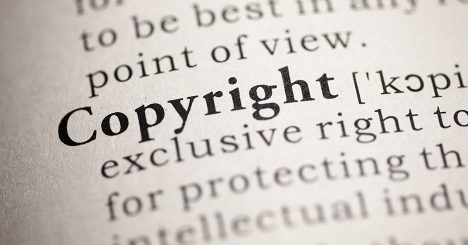The States did not commit enough piracy to save a copyright infringement statute from unconstitutionality, according to the US Supreme Court’s March 23, 2020, decision in Allen v. Cooper.
Video recordings and photographs of the salvage of Blackbeard’s ship, “Queen Anne’s Revenge,” were posted without permission by the State of North Carolina. The copyright owner sued the State for copyright infringement (the Supreme Court said “call it a ‘modern act of piracy’”) under the Copyright Remedy Clarification Act of 1990 (the “CRCA”), which specifically provides that the States are not immune from suit in federal court for copyright infringement, and provides the same remedies against States as against private parties.
Ironically, the very first copyright statute in the World was Great Britain’s Statute of Anne enacted in 1710, also named for Queen Anne.
Article I, section 8, clause 8, of the US Constitution, which the Court referred to as the “Intellectual Property Clause”, gives Congress the power to grant to authors and inventors for a limited time the exclusive rights to their writings and discoveries, which is the basis for the grant of copyrights and patents.
The Court explained that, in our federal system, each State is a sovereign entity, and cannot be sued in court without consent, under the principle of “sovereign immunity”. The Court said that sovereign immunity constrains federal courts from hearing lawsuits against States, but that the Court has allowed federal courts to hear lawsuits against nonconsenting States if two conditions are met:
- Congress enacted unequivocal statutory language abrogating the States’ immunity to suit.
- Some constitutional provision must allow Congress to encroach on the States’ sovereign immunity
The Court said it was clear that the CRCA met the first condition.
However, with respect to the second condition, the Court said that in a prior case, Florida Prepaid Postsecondary Educational Expense Bd. v. College Sav. Bank (1999) (“Florida Prepaid”), the Patent and Plant Variety Protection Clarification Act (the “Patent Remedies Act”), was found to be unconstitutional. The Patent Remedies Act was modelled after the CRCA and has the same wording and effect as the CRCA, except it deals with patents instead of copyrights.
The Court said that it was bound to follow this precedent, and so determined that the CRCA was unconstitutional, just as the Patent Remedies Act was unconstitutional.
The copyright owner raised two arguments for why the CRCA should be upheld as constitutional, so that his copyright infringement claim could proceed against the State of North Carolina.
First, he said that the Intellectual Property Clause from Article I gives the basis for upholding CRCA’s constitutionality, because without remedies against the States, the Intellectual Property Clause cannot grant exclusive rights to authors for their writings. But the Court said that an intellectual property owner’s right under the Intellectual Property Clause from Article I “stops when it runs into sovereign immunity.” The copyright owner argued that, in a prior case, the Court had determined that the bankruptcy clause in Article I, section 8, clause 4, DID allow Congress to subject nonconsenting States to federal court bankruptcy proceedings, but the Court said this was because bankruptcy is unique, and because if CRCA were upheld, then the Patent Remedies Act would also have to be upheld, which would require that the Court overrule the Florida Prepaid precedent that the Patent Remedies Act was unconstitutional. US courts often follow the doctrine of precedent or “stare decisis” and therefore rarely overrule previous judicial decisions. The Court said that, to overrule a precedent under stare decisis, requires a “special justification” beyond merely the belief that the precedent was wrongly decided.
Second, the copyright owner argued that section 5 of the 14th Amendment authorizes Congress to strip the States of
sovereign immunity. The Fourteenth Amendment states in section 1 that the States cannot “deprive any person of life, liberty, or property, without due process of law”, and section 5 gives Congress the “power to enforce, by appropriate legislation,” these limitations on the States’ authority.
However, the Court said that for a statute to abrogate a State’s sovereign immunity, the statute must be tailored to “remedy or prevent” conduct infringing on the Fourteenth Amendment’s prohibition on depriving a person of life, liberty, or property (or other prohibitions in section 1). The
Court said “a congressional abrogation is valid under section 5 only if it sufficiently connects to conduct courts have held section 1 to proscribe.” The Court said this requires that “[t]here must be a congruence and proportionality between the injury to be prevented or remedied and the means adopted to that end.”
The Court then asked “When does the Fourteenth Amendment care about copyright infringement?” It recognized that copyrights are a form of property, but said a merely negligent act does not deprive a person of property. The Court then cited the Florida Prepaid precedent, for the principle that unconstitutional infringement of patents is “intentional conduct for which there is no adequate state remedy,” and said that there was little evidence of that sort of infringement in the legislative record of the Patent Remedy Act, so that the abrogation of immunity “was out of all proportion to what it found.” The Court said Florida Prepaid found that the Patent Remedies Act exposed all States to the same remedies for patent infringement as private parties, so “it was not “responsive to, or designed to prevent, unconstitutional behavior.”
Applying the same analysis, the Court said that, before enacting CRCA, Congress had asked the Register of Copyrights to submit a report about copyright infringement and sovereign immunity. The report had concluded that “copyright proprietors have demonstrated they will suffer immediate harm if they are unable to sue infringing states in federal court.” Nevertheless, the Court said “Of the 12 infringements listed in the report, only two appear intentional, as they must be to raise a constitutional issue.” The far greater problem was the frequency of honest mistakes or innocent misunderstandings.
Based on this, the Court concluded “Under Florida Prepaid, the CRCA thus must fail our ‘congruence and proportionality’ test. . . In this case, as in that one, the statute aims to ‘provide a uniform remedy’ for statutory infringement, rather than to redress or prevent unconstitutional conduct.”
The last paragraph of section II of the Court’s opinion stated that Congress could later enact a law that links the scope of abrogation of sovereign immunity to the redress or prevention of unconstitutional injuries, and said “That kind of tailored statute can effectively stop States from behaving as copyright pirates. Even while respecting constitutional limits, it can bring digital Blackbeards to justice.”
Thus, as can be seen from the above, there was not enough evidence of unconstitutional intentional copyright infringement by the States to uphold the CRCA’s constitutionality. In other words, there wasn’t enough piracy by the States before CRCA was enacted.
Justice Thomas wrote that he joined the Court’s opinion, except that he did not agree that error alone cannot overcome stare decisis; he did not join the discussion about a possible future statute; and he thought that whether copyright is property under the Fourteenth Amendment is still an open question. However, no other justices joined in his opinion.
Justice Breyer, with Justice Ginsburg joining, said he disagreed with Florida Prepaid, but because Florida Prepaid controls this case, he concurred in the judgment.
There are a few takeaways from this case. The first is that, absent consent to being sued, States will continue to be immune from liability for copyright infringement, patent infringement, and other actions, despite any federal statutes that might forbid those actions, unless those federal statutes are tailored to link the scope of abrogation of sovereign immunity to the redress or prevention of unconstitutional injuries. The second is that the Court will continue to analogize patent and copyright cases to each other, freely applying principles and precedents from one to the other. The third is that Justice Thomas expressly does not believe the Court needs a “special justification” to overrule precedent under stare decisis, but six of the other justices joined the Court’s opinion stating that “special justification” is needed to overrule precedent (Justices Breyer and Ginsburg did not join the Court’s opinion). If a majority of the nine justices continues to require “special justification” for overruling precedent, this may lend stability to future laws.
This article was published as part of the Spring/Summer 2020 issue of ke kumu, Cades Schutte’s client newsletter. Read the full article of ke kumu, which explores some of the laws unique to Hawaii.





